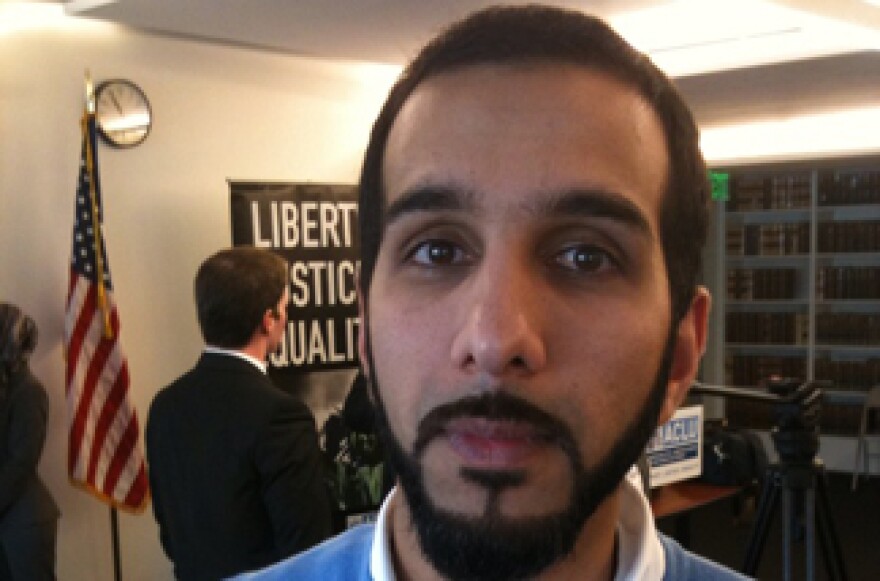This story is free to read because readers choose to support LAist. If you find value in independent local reporting, make a donation to power our newsroom today.
This archival content was originally written for and published on KPCC.org. Keep in mind that links and images may no longer work — and references may be outdated.
Muslims sue FBI for alleged First Amendment violation

Civil rights groups on Wednesday said they’ve sued the FBI for allegedly violating the First Amendment by spying on Orange County Muslims inside mosques. KPCC’s Frank Stoltze says the case focuses on the activities of a paid informant for the federal law enforcement agency.
One plaintiff in the lawsuit is 26-year-old Ali Malek. He recalled his initial encounter with Craig Monteilh.
“I first met Monteilh when he testified to his faith in front of roughly 1,000 people at the mosque in Irvine,” said Malek. “It was a ceremony in which you become a Muslim.”
Malek said his imam asked him to teach the convert about his new religion. He said Monteilh had other interests.
“Constantly he would ask me about jihad and what I thought about it,” said Malek. “My reaction initially was, he is a new Muslim, he just became Muslim, perhaps has some misconstrued ideas and perceptions of the religion and I was more than happy to clarify those misconceptions.”
When Monteilh continued his questions about jihad and began showing up at the gym where he worked out, Malek became suspicious.
“I thought he was weird and so I just wanted to keep my distance,” Malek said. “And I wanted to give it some time to see how the situation developed. And then when the case came out, all the pieces of the puzzle came together.”
Monteilh, it turned out, was working for the FBI. The Associated Press reports that the former fitness instructor with a criminal past spied on Orange County mosques for the FBI for more than a year from 2006 to 2007, recording conversations and meetings with a device concealed on his key ring and a camera hidden in a shirt button.
“I can not conceive of any, any legitimate purpose the government would have to send an informant into our mosques, to gather indiscriminately information, destroying the sanctity of our sacred space,” said Ameena Mirza Qazi with the Council on American Islamic Relations.
In their class action lawsuit, the council and the American Civil Liberties Union accuse the FBI of targeting Muslims based on their religion.
In a statement, the FBI refused to comment on its investigation, and said the agency investigates individuals based on whether they may threaten national security – not based on their religion.
Monteilh faces fraud charges in a separate case, and he apparently no longer works for the agency.
The ACLU’s Peter Bibring said the FBI is slowly moving away from restrictions Congress placed on it following revelations in the 1970s that it had indiscriminately spied on innocent American citizens.
“Over the past 10 years, we’ve seen the FBI steadily rolling back those protections, increasing their ability to initiate investigations without any indication of criminal activity,” said Bibring.
He says Muslims are a favorite post-Sept. 11, 2001 target. Imam Yassir Fazaga is with a therapist who works with the Orange County Islamic Foundation. He said he’s seen his clients become more paranoid about having personal conversations with him at a mosque.
“I can no longer discuss this with them at the mosque,” said Fazaga. “From now on I have to meet my clients in the park. I have to meet with them somewhere else where they would feel more comfortable than at the mosque.”
Malik, now an administrator for a San Francisco non-profit, said he too has become more suspicious.
“I feel that at times I am being followed,” he said. “I definitely feel that all my phone calls are tapped. I feel that my emails are filtered and tapped. I feel like I can’t have a loving conversation with my wife.
“My wife and I both feel that way. We feel like we can’t even keep the phone in the room on and have a loving conversation without assuming the FBI is monitoring that conversation. I feel like there’s probably FBI in this room right now.”
The class-action lawsuit seeks to stop the FBI from indiscriminately targeting Muslims and to force the agency to destroy any information collected that way. The three named plaintiffs also seek damages for emotional duress.








